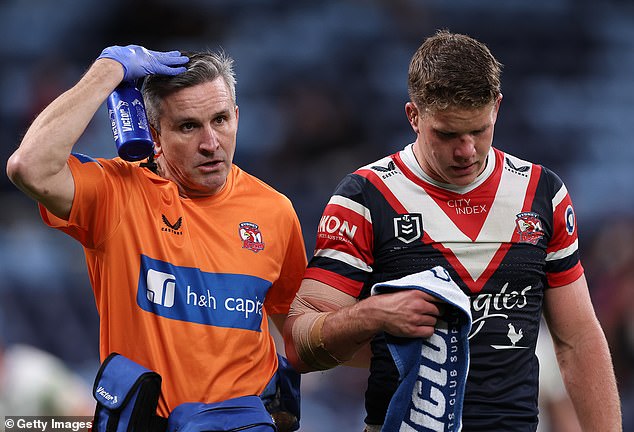- A new RLPA study has detailed some concerning statistics over concussion
- The study revealed that some players are returning too early after injury
- It also revealed that players are not correctly reporting concussion injuries
Concussion continues to be one of the biggest talking points in the NRL and NRLW.
Australian rugby league’s governing bodies have, this year, ramped up their concussion protocols, with speculation now revolving around whether the NRL and NRLW could alter kick-off rules, to prevent the number of head injuries that come from restarts.
As the league continues to establish the ways it can help combat concussion injuries, a Rugby League Players’ Association (RLPA) Player’s Pulse survey has found that a third of men and half of female players are not correctly reporting symptoms.
The survey has also revealed that players are continuing to train even after experiencing concussion symptoms in training.
The stats were revealed by The Daily Telegraph on Monday with almost 700 male and female players being included in the sample.
Of that group, approximately 22 per cent of NRL players and seven per cent of NRLW players experienced a concussion at training over the past 12 months.
It is understood that of those who experienced concussion symptoms, 36 per cent of the male players and 46 per cent of the female players continued to train.

Rugby League Players’ Association (RLPA) Player’s Pulse survey has found that a third of men and half of female players are not correctly reporting concussion symptoms

It is understood that of those who experienced concussion symptoms, 36 per cent of the male players and 46 per cent of the female players continued to train
Worryingly, 20 per centf of the NRL contingent felt pressured to continue, while 33 per cent of the female players included in the study felt the same, even after experiencing concussion symptoms.
The statistics added that 28 per cent of men and 40 per cent of women said they returned to action before being cleared by a doctor to recommence training.
Earlier this year, a mandatory 11-day stand-down rule was implemented for players who have suffered a concussion. Clubs are also being required to film every contact training session in order to mitigate concussion injuries, according to The Sydney Morning Herald.
It comes as more than 120 ex-Rugby League players have launched legal action against the Rugby Football League, the British Amateur Rugby League Association and the International Rugby League accusing the governing bodies of ‘failing to take reasonable care over the safety of its players’.
In April, Cronulla co-captain Dale Finucane was forced to announce his immediate and premature retirement from rugby league. His decision to hang up the boots came following advice from medical practitioners after having suffered multiple head injuries over the past few years.
Last year, Hull KR full-back Lachlan Coote retired with immediate effect after he had also suffered a series of concussions over the past few years.
According to The Daily Telegraph, the RLPA is pushing league bodies to up the precautionary and protection being afforded to players. Contact load assessments and technology that can help monitor impact have both been put forward.
A spokesperson for the NRL said: ‘The NRL has one of the most comprehensive head-injury policies and procedures in sport.

Concussion remains one of the biggest talking points not just in the NRL but in a wide range of sports around the world
‘The NRL has policies and procedures for match days and for club training that ensure that clubs have visibility about concussion risks during training and take appropriate action to address those risks.
‘These procedures are contained in the NRL Operations Manual and include requirements for club officials to monitor all contact sessions and ensure compliance with the stated protocols.
‘We will continue to invest in continuous education, training and compliance with protocols.
‘The NRL bases policies and decisions on conclusive data. We will continue to invest in research and review our policies regularly.’
This article was originally published by a www.dailymail.co.uk . Read the Original article here. .


